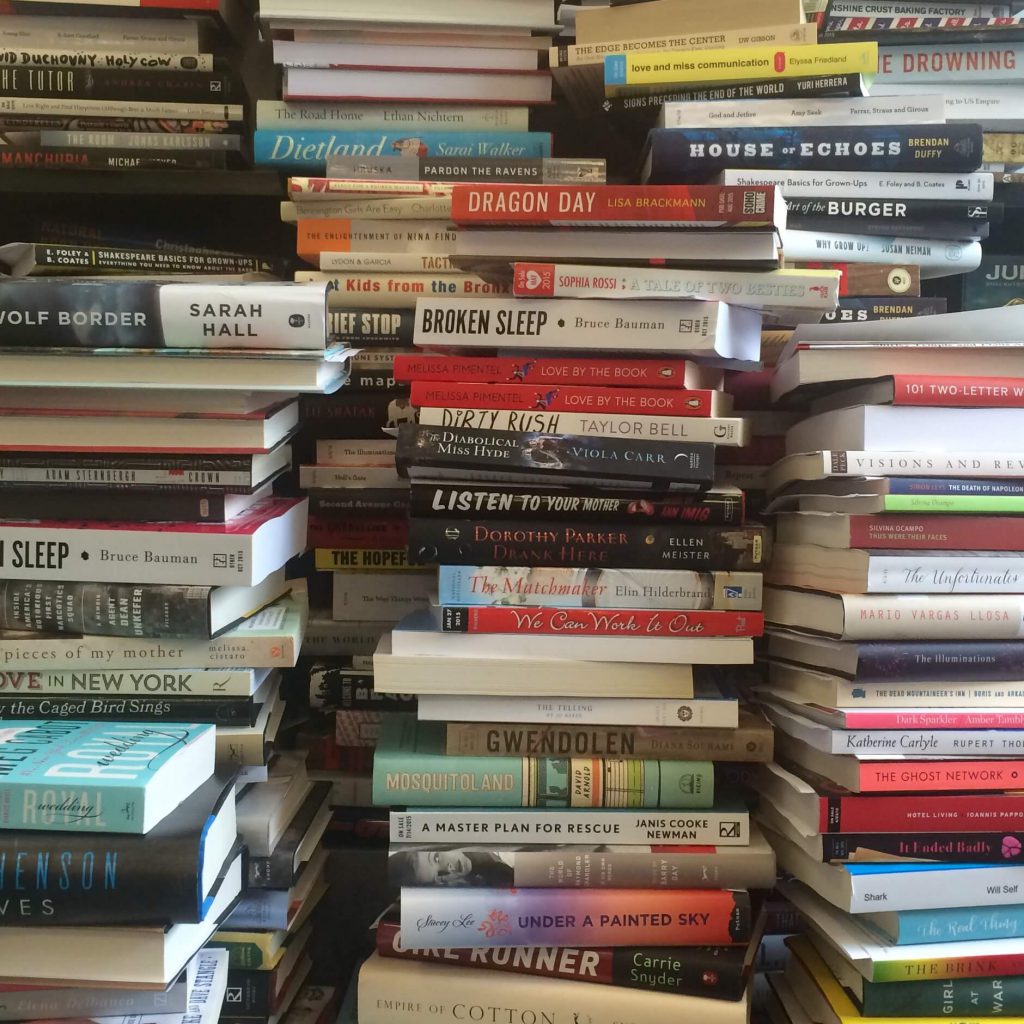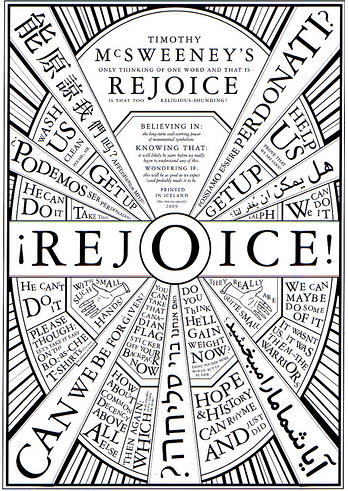McSweeney’s in the Age of Kickstarters: What One Project Does and Doesn’t Say about the State of Publishing

books and books and books and books
“Welcome to the official Kickstarter page for Greece!” This from a 2012 piece by John Flowers on McSweeney’s Internet Tendency, the McSweeney’s humor site.
“Greece is a small country in the south of Europe known for inventing democracy and western philosophy,” goes the fake Kickstarter “About This Project” section. “We wish to continue this good work… and so we come to you, our friends, for help.”
The joke here—well there are several jokes here, including one “Release the Kraken!”—is that Greece, as an entity both large and rich in cultural heritage, looks ludicrous asking for money on Kickstarter. This piece is funny in high-brow ways (hello, Costa Gavras and Socrates references) but its central conceit is basic: It is extraordinarily difficult to ask for money and not look, or feel, ludicrous.
McSweeney’s, founded in 1998 by Dave Eggers, puts out books, two literary magazines (The Quarterly Concern and The Believer), a humor website (the Internet Tendency), and a podcast (the Organist). It once even published a DVD magazine, Wholphin, between 2005 and 2012. The organization has also given birth to 826 National, a tutoring nonprofit; crowdfunding scholarship platform ScholarMatch; the Valentino Achak Deng Foundation, which does work in South Sudan; publisher and education program Voice of Witness; and food magazine Lucky Peach. (The last went totally solo in 2013.) This is all to say that McSweeney’s does a lot, and does it well. So on Monday, May 4, when the publishing enterprise announced their intention to raise $150,000 through Kickstarter, a chorus of supporters rose up. They hit 20% of their goal on the first day and 50% within five. As I write this, they’re hovering just above $190,000—more than 20% over their original target. McSweeney’s, it turns out, is also very good at Kickstarter.
For those who follow the publisher, the Kickstarter announcement likely didn’t come as a surprise. McSweeney’s announced its transition to nonprofit status in October 2014 and outlined ways readers could help support their mission: by donating, by buying books and subscriptions, and by sharing McSweeney’s work on and offline. All these requests fit into the work a Kickstarter does, but with the added pressure of time—the uncertainty and excitement of a deadline. As a nonprofit, McSweeney’s joins the ranks of publishers Graywolf Press, Coffee House Press, Copper Canyon Press, and The Library of America.
“We’ve always been pretty open about that over the years, the viability of an independent press,” Jordan Bass, McSweeney’s editor-in-chief, told BuzzFeed News. “Trying to publish an experimental literary magazine is never going to be a blue chip enterprise.”
“The big shift,” Shannon David, McSweeney’s Development Director, told me, “is that we’ll be able to find support for projects in advance rather than publishing the book and waiting for it to be balanced out after.”
David framed the Kickstarter around this transitional period from for-profit to nonprofit enterprise. “There’s just a lot involved,” she said. “It’s a big process.” In addition to the publisher’s normal work (i.e., publishing), the organization is navigating a lengthy 501(c)(3) application process and building up the grant and foundational support, as well as the membership base, that successful nonprofits rely on. The fundraising they do now will cover production costs for the next issues of the Believer and the Quarterly Concern, a new season of The Organist, a website redesign, and publicity expenses for three forthcoming books—all while McSweeney’s is in what David called the “logistical wormhole” of this major shift.
“When I first arrived at Kickstarter I was trying to think of dream projects to do,” said Maris Kreizman, who joined Kickstarter in March 2014 as their publishing community manager. “McSweeney’s and Emily Books were the ones I thought of.” Kreizman has since shepherded both organizations towards successfully funded projects.
“McSweeney’s is truly a beloved institution,” she said. “For me in particular, this is a great model project to go out in the world with and say ‘This is the kind of thing we do, we have room for more.’ People don’t automatically think about Kickstarter in book publishing the same way people think about it in terms of film and design and technology.”
“There was a level of wooing,” Kreizman said. “I sent Andi [Winnette, McSweeney’s managing editor] an email last year.” Only after the publisher created a position for fundraising—the role Shannon Davis now occupies—were they really able to get started. “We’ve been working on this for six months,” Kreizman said.


Kreizman points to McSweeney’s long history of beautifully designed and illustrated work as one key to their Kickstarter success. “Not every writer or publisher has great visuals,” she said. They are a big part of what sells. The rewards, too, are plentiful and delightfully strange: Spike Jonze will handwrite a love note on your behalf, Geoff Dyer will record your outgoing voicemail message, Dave Eggers will have a picnic with you in Golden Gate Park, Sheila Heti will write you a personalized short story, Alexander Chee will read your tarot cards, Wells Tower will give you his Allen wrenches, David Cross will give you a random book from his shelves, the staff of The Onion will insult you, Colin Nissan, author of “It’s Decorative Gourd Season, Motherfuckers,” will sign you a decorative gourd.
“They’re going to be real gourds!” David told me. “They won’t even last beyond the season!” Sixty-five of the gourds (which run for $40 a pop) have already been purchased. “We had no idea if anyone would actually want it. People just love ‘Decorative Gourd Season.’”
“Yes, McSweeney’s is really witty and high-brow,” Kreizman said, “but there’s a level of earnestness here.” The publisher’s previous crowdfunding project—a 2013 Crowdhoster campaign celebrating McSweeney’s 15th anniversary—had a goal of only $15. While they ended up raising 204,166% of that goal (about $30,000), by setting the bar so low McSweeney’s sidestepped both naming how much they really intended to raise and the risk of failure. This Kickstarter campaign is an altogether more vulnerable, and in some ways brave, endeavor.
Many people I spoke with about McSweeney’s brought up other literary Kickstarters they had supported—in particular Emily Books, an indie ebookstore run by Emily Gould and Ruth Curry that “celebrates the best work of transgressive writers of the past, present, and future.” Their project was successfully funded this past March.
“You do feel vulnerable and you do feel like you are sitting there with your hand out,” said Emily Gould. “It was really wonderful in ways that surprised me, but it was also psychologically taxing in ways that surprised me too.”
“At midmonth we were reconciling ourselves to the possibility that it would fail,” she went on. Gould talked about the tension that many Kickstarter projects exhibit: They exist both to fundraise and to sell. “I tried not to apologize,” she said. “Apologizing is not a very successful technique for asking for money, and it wasn’t appropriate for what we were doing. “We weren’t asking for a charitable donation,” she went on, “we were asking people to buy our books! Which is what we want them to do anyway,”
Stock Tips, a January 2014 soup zine Kickstarter project, differs in kind and in size from Emily Books and McSweeney’s organizational projects. Run by Tumblr book world liaison Rachel Fershleiser and Goodreads-alum Ami Greko, Stock Tips made sense on Kickstarter as a streamlined preordering system. “We weren’t really saying ‘support us because we’re an organization you want to see in the world,’” said Fershleiser.
McSweeney’s, Fershleiser said, is asking its backers to support them because of who they are. But they also do “a great job of offering genuinely desirable rewards, which means it’s less charity case than fire sale.”
“I’m making out pretty well for my $87.”
Few have publically expressed unease about the McSweeney’s Kickstarter, but those who have use it as an example of larger trends in publishing.
“What do we think of a publishing climate where something as well regarded as McSweeney’s is going on Kickstarter?” novelist Seth Greenland asked his Los Angeles Review of Books Radio Hour cohosts on an episode that aired May 21st.
McSweeney’s was “not making enough money to do it in the traditional way,” LARB founding editor Tom Lutz responded. “That’s the one thing we know for sure, right?”
“Literary publishing is not a high profit endeavor,” Lutz went on, “but it struck me as a little scary that good literary publishing needs public support. I think of McSweeney’s as a very successful and—in the small, indie world—a fairly large publisher.”
But the reasoning behind publisher’s decision turn to crowdfunding belies this canary-in-the-coal-mine picture. Ultimately McSweeney’s Kickstarter says more about McSweeney’s in particular than it does about literary publishing in general.
“I increasingly want to carve out as much time as I can to write, not to manage,” Dave Eggers told the San Francisco Chronicle last October.
Eggers has described the publisher’s finances as “break even” since its inception. McSweeney’s, which shares its name with Egger’s mother, has been publishing his novels since 2002’s You Shall Know Our Velocity! As the author of books that sell millions of copies, Egger’s has surely been a large part of McSweeney’s balance sheet. Eggers told the Chronicle that it’s an open question whether or not McSweeney’s will publish his books in the future. (His two most recent novels, The Circle and Your Fathers, Where Are They? And the Prophets, Do They Live Forever?, were published in partnership with Alfred A. Knopf.) “The beauty is,” he said, “as a nonprofit, the company won’t sink or swim any given season based on whether or not I have a book out.”
The switch to nonprofit status “will help set up McSweeney’s to sustain itself,” David told me, and sustain itself presumably without (or with less of) Eggers’s fiscal and managerial support. “That’s the goal.”
“I’m very wary of stuff that’s like ‘help us keep the doors open another month,’” Rachel Fershleiser said. “I’d rather support a specific project from a sustainable organization than a desperate Hail Mary.” Fershleiser has backed nearly 70 Kickstarter projects, from McSweeney’s and Emily Books to goat milk soap and something called a “zen egg.” (It looks rather handsome.) “If you’re essentially asking me to buy a book or lit mag or gala ticket or zine, you’re not reeeaaaally asking for money,” she said. “You’re saying ‘Here’s an awesome thing we want to do, if you want one/a piece of it, here’s how.’”
Kickstarting a project “makes you feel like a Medici or something,” LARB fiction editor Laurie Winer said on the LARB Radio Hour. “It makes you feel like you are influencing your culture.”
“Well you are, too, right?” her cohost Tom Lutz asked.
The projects that Library Journal media editor Stephanie Klose has backed have been “all over the map. The Morbid Anatomy museum, the dance studio in my neighborhood, Emily Books.”
“Sometimes it’s because I want a specific reward. Sometimes it’s because it’s a project I really want to see come into being. Sometimes it’s because I know somebody involved.”
“Most of the stuff I Kickstart is stuff I’ve familiar with,” said Andrew Hertzberg, a writer based in Chicago, But with “the internet, globalization—everything is sort of connected on that grand scale.” When he decided to contribute to literary magazine Guernica’s July 2014 Kickstarter, he did so as a reader. “I don’t think I could go up to anybody at Guernica and start talking to them and feel an immediate connection,” he said, but “I can take inspiration from them and spread it to other communities I’m involved with.”
“I don’t expect anyone on the fundraising side to say you are really a part of this—that’s just not the level that I’m giving at,” novelist Adrienne Celt told me. “It’s also not the point of these Kickstarters. But I do feel a more personal investment in their success, and that’s positive.”
“It feels like the small business equivalent of an NPR pledge drive.” Matt Mullin, Reading Room sales director and backer of eleven Kickstarters said, echoing the strange tension between business and charity at work in many of these projects. But for him that combination is a positive one. He knows that the writers and publishers who produce these projects are “earnest, dedicated, and sincere.” He learns the story behind the product, he becomes invested in its journey. “I don’t get that from any other commerce experience.”


Emily Gould of Emily Books
Celt, as another frequent Kickstarter backer, feels more ambivalent. “I have mixed feelings about it,” she said. She wishes there was a more established system of philanthropy for the literary arts. “There’s a board for things like the Met, for things like the opera. There are people who contribute huge amounts of money for what they consider to be huge art institutions.”
But Celt’s desire to support good work on an individual basis usually outweighs her general misgivings. “I do think that most people within the literary community, writers and poets and publishing people, all of us who sort of know one another, even people who don’t know one another but aspire to belong to the publishing community, have a sense that a rising tide lifts all ships. Though I’d prefer an infrastructure that provided funding, I want to give as much as I can. In all of the different ways I can.”
“I’m a publishing person,” Emily Gould said. “I believe in publishers. I believe in creating sustainable infrastructures that produce books.” For her, projects like Emily Books and McSweeney’s fit into that vision. Kickstarter was one of several fundraising tools available to her and Curry, including more traditional options such as throwing a party or having a sale. Kickstarter just made the most sense for what Gould and Curry wanted to get done and when. The platform’s simplicity was appealing, and the fundraising campaign doubled as a marketing one. Kickstarter was also able to gather Emily Books supporters in one place. It didn’t necessarily alter the fate of the ebookstore—this was no Hail Mary pass—but it helped Emily Books “get where we were going faster.”
Shannon David also sees Kickstarter as valuable in ways that are bigger than fundraising. For her, it’s about “getting our name out there in the world and getting new audiences. We’re receiving support from readers but also from people who have never heard of us before—people who found us just browsing through Kickstarter.”
When I spoke to David, McSweeney’s had just hit its funding goal. “It’s so thrilling,” she said. “We’re definitely not stopping there.” Their current goal is reach 3,000 backers—one that if met will result in an extra $20,000 from Mailchimp. (As I write this, they’re hovering above 2,600.) “Even joining with a pledge of one dollar is a huge help to us.”
I’ve kept the McSweeney’s Kickstarter page open in a tab for about a week now and watched the number of backers and the total amount pledge rise steadily. I’ve also watch the available number of my favorite reward—the gourds—shrink. I too love “Decorative Gourd Season”; its appearance on my social media feeds marks the coming of fall as evocatively as actual decorative gourds or the KXVO Pumpkin Dance.
“Whenever those guys reach out for anything, I immediately sign on,” Colin Nissan, who wrote the piece in 2009, and who will be signing up to 100 decorative gourds on behalf of McSweeney’s, said. “They’re the best.”
Chris Monks, the Internet Tendency’s managing editor, reached out with the idea to sign gourds. “I thought it was hilarious,” Nissan said, “It’s the weirdest surface you could ever write on.” They’re planning on having a gourd party in the fall.
“When I first started to write, seven or eight years ago, there was nobody out there but the New Yorker’s “Shouts and Murmurs” section that would publish short strange pieces like [‘Decorative Gourd Season’]. And the New Yorker has like Woody Allen and Steve Martin writing for them.” McSweeney’s Internet Tendency was the exception. “It was a big deal,” to have that venue, Nissan told me, “I don’t think I would have been writing without it. A lot of writers, including me, owe so much to those guys.”
I bought the gourd. After all, it’s a good cause.
Follow Molly McArdle on twitter @mollitudo
You might also like 



















